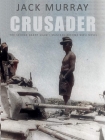Crusader (A Novel of WWII Tank Warfare) by Jack Murray (important of reading books .TXT) 📗

- Author: Jack Murray
Book online «Crusader (A Novel of WWII Tank Warfare) by Jack Murray (important of reading books .TXT) 📗». Author Jack Murray
No one spoke for a few seconds as they listened to the distantsounds of enemy armour moving. As if to confirm what they were thinking, somesmall arms fire broke out from both sides.
‘It sounds as if we’ve found the fight we were looking for, sir,’said Major Miller.
‘Yes, it does,’ agreed Lister. He felt it important to be sincere,though.
‘Unfortunately when Cunningham first envisaged it, I suspect hedidn’t think we’d be quite so dispersed. In summary, gentlemen, this could bebecome a something of a melee.’
16
Gambut, 50 miles east of Tobruk, Libya, November 19th,1941
The sun rose. And then it rose a bit more. Manfred looked at it,as he did every day, with some wonder and fear. There were two armies facingone another but they had a common enemy, too. The continent of Africa seemed tobe conspiring to rid itself of the combatants. Rather like Aesop’s fable of thenorth wind and the sun, it was using its weapons in a daily blitz. The heat ofthe day, the freezing cold of the night as well as the occasional sandstorms, and,of course, the flies. The omnipresent flies that tortured you every day: findingtheir way into the food as you were eating; gorging themselves on the dead.
The sun-beaten landscape seemed to stretch forever. Silent, remoteand forbidding, it promised only pain. Not for the last time did Manfred wonderwhat he was doing here. What was anyone doing here? No one wanted to be here.He doubted the Tommies felt anymore disposed towards this alien location thanhe did. He stared out into the nothingness with unblinking concentration.
Still holding his coffee cup he drained it for what seemed likethe fifth time. It was barely 0730. A whole day stretched in front as welcomingas the parched landscape before him. The men around him didn’t seem to care.They insisted that this was preferable to gut-wrenching fear of combat. Hebelieved them but a part of him longed for something to happen. Three monthsand he’d seen nothing of the enemy. It seemed both sides had tacitly agreed itwas simply too hot to fight. It seemed but a short step, to Manfred, to extendthe idea.
‘Brehme,’ shouted Sergeant Overath, ‘Get ready. We’re pullingout.’
‘What’s happening?’
‘We’re pulling out. Save your questions,’ replied Overath.
In a matter of moments, Manfred was inside the Panzer III tank. Hejoined Overath and Kastner in the turret. Kohler and Fischer sat below in thehull. Overath stared down at Manfred and checked final details before they setoff.
‘Fuel?’
‘Full up, sir, and we have reserve loaded also.’
‘Water?’
Kohler called up and confirmed he’d loaded the water and two daysof food supplies.
‘Ammunition? It would help if we had something to shoot with.’
‘All correct, sir,’ said Manfred, by now used to Overath’s drysarcasm.
Overath grunted and glanced at Kastner. Seconds later the 12cylinder engine growled into life. This caused an immediate rise in the smellof petrol fumes. Manfred was used to this now, but it was no more welcome.Outside the tank they heard the sound of fifty other engines revving. Theysensed the movement of the tanks and then, they began to move also.
One by one the tanks moved out; five to ten metres apart. A cloudof dust was thrown up in the wake of the moving vehicles. The speed wasparalyzingly slow. Less than twenty kilometres per hour. Then again, what wasthe rush?
Ahead of them Manfred saw armoured vehicles pulling the enormous eighty-eightmillimetre anti-tank guns. Manfred looked through his viewer and felt a surgeof pride in these weapons. Originally developed by Krupp in the thirties asanti-aircraft cannons they had become a deadly killer of tanks in the desert.
‘They’ve no chance against these,’ Kastner had said. Manfreddidn’t argue. They were enormous. The barrel was over six metres long. It firedshells around fifteen thousand metres. It could kill a tank at a couple ofthousand metres. Best of all, the allies had nothing like this. It was likeholding a child at arm’s length and watch, amused, as flailing punches failedto land anywhere near.
The tanks would be arrayed behind the anti-tank guns in readinessto attack the infantry. As yet the allies were not working in the unified waythat the Afrika Korps had developed. The Afrika Korps operated likemulti-function units rather than as individual parts of the armed servicesfighting alongside, but apart from, the other services.
Overath studied the maps he’d laid out earlier. Manfred glanced atthem before returning his gaze to the gun barrels glistening in the sun.Within minutes of starting the temperature in the tank had soared to levelsthat Manfred would once have found unbearable. Yet it was still early morning.It would get worse. The heat, the smell of men’s bodies and the fumes made foran unhealthy cocktail.
The tank bumped and rolled along. Another change in Manfred. Threemonths ago he would have felt motion sickness. Now the movement was a minorirritation against the many other things he would happily have complainedabout. He made no complaint, of course. The privations were borne stoically. Noone was exempt from the brutal life they were leading.
And so they drove in this unremarkable and inhospitable landscapefor two hours. The minutes ticked by slowly. Inside the tank, the air was thickand stifling. It discouraged conversation very quickly. For most of the journeyfrom the camp to their destination the tank remained silent except foroccasional warning shouts by Overath to Kastner to slow down as they pulled uptoo close to the tank in front. Overath was sitting atop, connected to the restof the tank via a radio.
Manfred, as the newest man in the tank, was loader and





Comments (0)